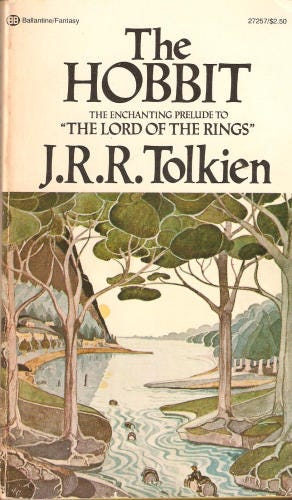Since 1977, I have been a big fan of the father of modern fantasy, J.R.R. Tolkien. At eleven years old, thanks to Ms. Thompson at Northside Middle School in West Columbia, South Carolina, I read The Hobbit as a class assignment. Immediately afterward, I consumed The Lord of the Rings, and once The Silmarillion came out in paperback, I inhaled it, too. Let’s just say I read everything he wrote that I could get my hands on.

Last of all, I think, I read some of his nonfiction, particularly his essay, On Fairy-Stories (read here). It was the first time I was exposed to the word “sub-creator,” which Tolkien first mentions about a quarter of the way into the essay: “But in such ‘fantasy,’ as it is called, new form is made; Faerie begins; Man becomes a sub-creator.”
Besides being a professor of philology at Oxford University, Tolkien was a deeply religious man, a practicing Catholic, who took Communion daily (lembas, anyone?). Few readers of his fiction realize how much his beliefs influenced his masterwork (for instance, the Fellowship left Rivendell on December 25, and Frodo completed the quest on March 25, traditional Easter). The title of the third volume, The Return of the King, is an obvious analog to the second coming of Christ as King of kings and Lord of lords. And there are many more parallels we could draw.
In On Fairy-Stories, Tolkien proposes that human beings, made in God’s image, are drawn to fantasy because writing in the genre is almost entirely an act of creation, a product of the author’s imagination that produces a secondary world that is “real” in the sense that it functions in a reasonable fashion according to it own laws and limitations. Because God is the true Creator, and His creation is the real and superior one, anything a human creates in imitation of what God has done is lesser, a sub-creation (the term “worldbuilding,” probably unknowingly, gives a nod to this creation concept).
Further, Tolkien believed that sub-creators should attempt to retell the Great Story, His Plan, or the Gospel, through their sub-creations. If memory serves, I believe this belief was a significant point in helping his fellow Inkling, C.S. Lewis, turn from his agnosticism. However, Professor Tolkien famously did not care for allegory or retelling the story of salvation in a way that hewed too close to the biblical revelation of God’s outworking among humanity. As the Bible’s ultimate Author, God had already done a marvelous job of that. The sub-creator, then, should use his God-given imagination to present a work that incorporates the essence of revelation or certain points or principles from it in a fresh way.
Perhaps more than other genres, epic fantasy can convey universal truths, ideas, and philosophies through its quest plots, white-hats vs. black-hats conflicts, and wide-ranging casts of species, beasts, and worlds. The only limit is the author’s imagination. So, works like Dante’s Inferno, The Pilgrim’s Progress, Grimm’s Fairy Tales, Aesop’s Fables, Lewis’ Narnia series, Alice in Wonderland, The Wizard of Oz, Peter Pan, and The Princess Bride, all fantastic literature, have given readers new and different perspectives on human nature, life, society, religion, politics, and movements that other forms must struggle to achieve. Some authors have used this power responsibly, though lately, many writers seem to have taken the low road into ugliness, in my opinion.
More than a quarter-century ago, when some in my very conservative church discovered that I read fantasy, particularly Tolkien’s works, a sweet, old couple from Georgia (now deceased) disagreed with my choice. To them, all fantasy was demonic. It contained magic, evil characters, unimaginable horrors, and general ungodliness.
I cannot say I changed their minds about it, but I at least made them ponder the fact that the Bible itself contains all of the things they had objected to in fantasy writing. As one minister once said in my hearing, it tells the tale of humanity, warts and all. The Bible is not reticent about exposing the worst of human vices and sins (including sorcery, e.g., the Witch of Endor), the lengths people will go to possess and dominate others, the reality of antagonistic spirits in the world, and the devastating horrors that have and will take place due to human pride and selfishness. The prophetic book of Revelation, with its use of symbols, dragons, beasts, and plagues, in some ways reads like a work of (true) fantasy.
Besides, I explained to this couple, Jesus Himself used imaginative, fictional stories throughout His ministry to draw attention to specific truths and principles that He wished to impart to a general audience, as well as to His disciples. And not all of them are “nice.” These tales are called parables (from Greek parabolē, “analogy”). Jesus understood that stories are an excellent way to both conceal and expose nuggets of truth. As a bonus, if well-constructed, they stick in the hearer’s/reader’s memory, providing years of instruction in wisdom.
So, after all this background, what is my philosophy of fantasy writing?
First, I agree with Tolkien that people, made in the image of God, desire to use their skills and gifts to create—or, more correctly, sub-create.
Second, humans love stories, and the best stories convey universal truths that will lift and benefit the reader.
Third, when done right, the fantasy genre excels in telling imaginative, memorable, and compelling tales that mirror human life and provide wisdom and guidance without excessive preaching.
Fourth, despite its imaginative nature, fantasy must have verisimilitude (“the quality of seeming real or true”), including the good and the bad, to be effective; readers take little from it if they have nothing in common with the story, its characters, or its theme.
Finally, it is not contrary to Christian ethics to read or write fantastic literature unless it glorifies sinfulness and rebellion against God.
My fantasy writing tends to be more “realistic,” more like medieval adventure stories with an occasional and sometimes surprising fantastical element thrown in. It will not shrink from presenting characters with real-life moral failures, but conversely, it will not glorify them. The reader can expect to sense my bias toward wisdom, beauty, morality, and, of course, the Great Story that I believe God is working out (but without sounding preachy).
I hope you enjoy these tales.
If you have enjoyed what you read on this Substack, please consider buying me a cup of coffee!
A note:
Tolkien, Lewis, and G.K. Chesterton agreed that including violence and even images of evil and horror is not outside the bounds of children’s literature. Their essential reason for thinking so is that children need to see evil as real and ultimately vanquished. So, scenes of evil cannot be gratuitous but instructive and encouraging, illustrating that evil can and will be defeated.
Substacker Aaron Earls writes in his read-along essay covering Lewis’ Prince Caspian: Chapter 14 “How All Were Very Busy”:
Some may object to such depictions in a children’s book, but Lewis disagreed. In “On Three Ways of Writing for Children,” he says the authors shouldn’t expose children to “anything likely to give the child those haunting, disabling, pathological fears against which ordinary courage is helpless.” But that is not the same as attempting to “keep out of his mind the knowledge that he is born into a world of death, violence, wounds, adventure, heroism and cowardice, good and evil.” He asserted that since children will likely “meet cruel enemies, let them at least have heard of brave knights and heroic courage.”
Lewis borrowed this from G.K. Chesterton who argued that fairy tales don’t introduce the idea of evil but affirm for the child that evil will be conquered. “The baby has known the dragon intimately ever since he had an imagination,” Chesterton said in “The Red Angel.” “What the fairy tale provides him is a St. George to kill the dragon.”
In our day, a day of anti-heroes and the glorification of villains, an approach such as these three Christian authors demonstrated acts as a balance. It would be wonderful for children not to have to worry about evil at all, but since it exists, they are far better prepared to live and grow in a sinful world having seen heroes stand up to evil and overcome it.





I recently saw this quotation from U2 front man, Bono. While I do not fully support his interpretation of Psalm 40, his comments about Scripture parallel the gist of part of my thoughts in this essay:
“Psalm 40 is interesting in that it suggests a time in which grace will replace karma, and love replace the very strict laws of Moses (i.e. fulfill them). I love that thought. David, who committed some of the most selfish as well as selfless acts, was depending on it. That the scriptures are brim full of hustlers, murderers, cowards, adulterers, and mercenaries used to shock me; now it is a source of great comfort.”
Thanks for sharing this. :)